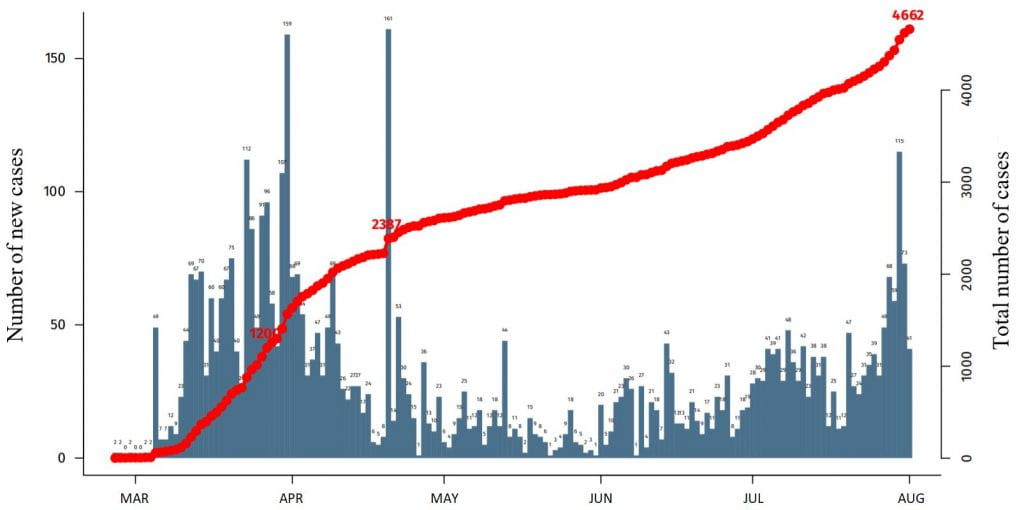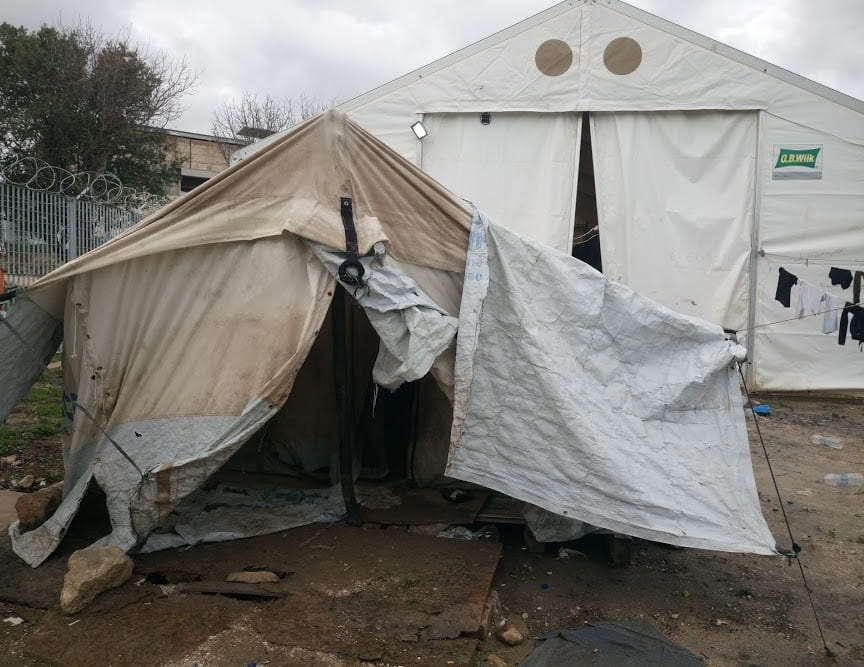Letter from Afar – the blog series about life and research in the time of COVID-19.
By Theodoros Fouskas.
Dear friends,
I hope you are staying safe and keeping well.
The first COVID-19 case was diagnosed in Greece on 26th February 2020 (National Public Health Organization, 2020a). As subsequent cases in late February and early March were confirmed the government began to implement lockdown measures. Between 10th and 18th March, educational institutions and shops nationwide suspended operations, along with cinemas, gyms, courtrooms, shopping malls, cafés, restaurants, bars, beauty salons, museums and archaeological sites, beaches and ski resorts. On 23rd March, with 695 confirmed cases and 17 deaths, a nationwide restriction on movement was enforced, whereby citizens could only leave their homes for specific reasons and with a special permit. The gradual reduction of these measures began on 4th May.
The data below show cases from the epidemiological surveillance of the disease of the novel coronavirus, based on statistics of the National Public Health Organization and recorded up to 2nd August. The latest confirmed laboratory cases of the disease numbered 75, of which 4 were identified at entry points of the country. The total number of cases is 4,662 (daily change +1.6%), of which 54.7% were men. The latest recorded daily deaths of COVID-19 patients were 2, while a total of 208 deaths have been reported since the outbreak began. The average age of patients who have died was 76 years. The number of patients hospitalised and intubated were 12 (83.3% men) (National Public Health Organization, 2020b).
Figure 1: Number of laboratory confirmed COVID-19 cases in Greece by 2nd August 2020

In Greece, thousands of asylum seekers, refugees and migrants are living in unsafe and degrading conditions in camps on the Aegean islands and on the mainland. These camps are severely overcrowded. Multiple deficiencies and lack of medical doctors have resulted in numerous health issues. Deterioration of health is also due to weather conditions as there is no insulation or heated accommodation in the winter. Many third-country nationals (TCNs) feel insecure under these precarious conditions, having already suffered abuse or trauma. In the Reception and Identification Centres (RICs), medical doctors and NGO staff agree with the asylum seekers, refugees and migrants that measures against the spread of the coronavirus are severely lacking in such overcrowded spaces with little access to proper healthcare services.
TCNs inside the RICs are crammed into small individual tents or makeshift shelters with wooden walls and canvas rooves. These spaces offer little or no privacy. A blanket serves as a door and mats as a floor, providing insufficient insulation from harsh weather conditions and temperature changes (extreme heat in summer and freezing cold in winter). As the World Health Organization (WHO) (2020) states, asylum seekers, refugees and migrants are exposed to increased risks of contracting diseases such as COVID-19 due to the overcrowded facilities and lack of basic public health conditions where they are living.

COVID-19 cases were detected in accommodation centres in mainland Greece from mid-March. After the first case was detected multiple attempts to enter via the Greek-Turkish land border led to a border closure policy and the suspension of asylum applications. Table 1 shows the number of cases detected in accommodation centres:
Table 1: COVID-19 cases among migrants, asylum seekers and refugees in Greece
| Area | Date | Cases |
| Ritsona | 31 March, 2020 | 23 |
| Malakasa, East Attica | 5 April, 2020 | 1 |
| Koutsohero, Larissa | 10 April, 2020 | Quarantined after tracing a Roma case |
| Porto Heli, Argolida | 19 April, 2020 | 1 |
| Kranidi, Argolida | 20 April, 2020 | 150 |
| Megala Therma, Lesvos | 12 May, 2020 | 2 |
| Efthalou beach, Southern Lesvos | 15 May, 2020 | 2 |
| Kranidi, Argolida | 26 May, 2020 | 3 |
| Nea Kavala, Kilkis | 3 June, 2020 | 1 |
| Northwest coast of Lesvos | 27 June, 2020 | 3 |
Protective measures against COVID-19 in the RICs, in the accommodation centres and in the Asylum Service were implemented from mid-March. The measures included the postponement of activities such as school classes (synchronous and asynchronous distance learning projects implemented during the lockdown) and exercise routines. Newcomers were checked for COVID-19 symptoms and confined to quarantine if found to be unwell (Kathimerini, 2020). TCNs were discouraged from strolling around the facilities or going outside the RICs, even to obtain supplies. The restriction on movement entitled ‘Measures against the occurrence and spread of cases of coronavirus COVID-19 in the Reception and Identification Centers, throughout the Territory, for the period from 21.3.2020 to 21.4.2020’ was extended via the relevant Joint Ministerial Decisions (Minister of Civil Protection, Minister of Health, Minister of Migration and Asylum) until 31st August (the measures apply to all types of accommodation structures throughout Greece, aiming at preventing the occurrence and spread of COVID-19). This was problematic as there was concurrently a lifting of restrictions for the public (from 4th May) and for international visitors (from 15th June).
It is extremely difficult to take the necessary precautionary measures against the pandemic in the RICs and accommodation centres, such as maintaining social/physical distancing between individuals and implementing hygiene rules. The overcrowded structures on the islands urgently need decongesting while on the mainland efforts to create new housing are crucial in order to contain the COVID‐19 virus in a humane and dignified way.
Warm wishes and stay well,
Theodoros

